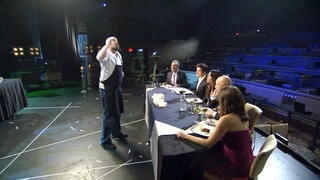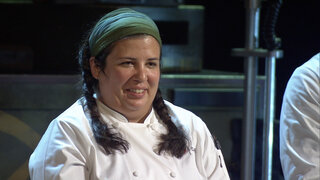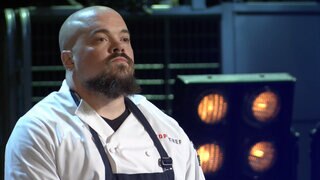Gail: With This Challenge the Stakes Were Much Higher
Top Chef judge Gail Simmons dishes on an ageless guest judge and the remaining cheftestants.

This was a different start to a finale than we have ever done before, instead of a regular Quickfire and the Elimination. We kept the essence of the Quickfire, in that we didn’t eliminate anyone and just picked a winner, but the challenge itself was a far more in depth, requiring our chefs to cook for 150 people, when usually the Quickfire is just for a guest judge and Padma. With this challenge the stakes were much higher, and there was $25,000 on the line.
I like that we dug a little bit into the history of card playing and origin of suits of the cards, which gave us a lot of great ingredients to cook with and a fun game to play, in which the highest class, Royalty, downward from Clergy to Merchants to Peasants, could steal ingredients from the classes below them, but the lower the class, the less access you had to ingredients. We were impressed with what our contestants came up with based on the food they were able to use. The two best dishes of this challenge were Jeremy and Amar, an interesting outcome as they were the two lowest classes and had to be extra creative about what they made. Amar had very few ingredients to work with and took a chance making chicken liver, a polarizing food that many people don’t like. He cooked it beautifully and it had so much flavor, it smelled and tasted so delicious that even the most finicky eaters at the event loved it.
Jeremy cooked poached chicken, which could have come across as too simple. But his dish was delicious, so moist with incredibly crispy chicken skin cracklings on top and pickled sweet and hot grapes as a garnish. I said it in the episode and I really meant how innovative and interesting the texture and flavor of those grapes were, and how much they added to the dish. It was this kind of smart thinking which really set his dish apart. The success of their dishes proved that so sometimes when you can do anything you want, and have no restrictions, it’s not always an advantage. A lot of chefs work well under limitations; it feeds their creativity and forces them to think a little out of the box. Isaac and Marjorie both made good food that day too; it just was no where as exciting and flavorful. I remember speaking at the time to the other judges about Marjorie’s dish in particular, and considering she could do anything she wanted as she was the highest class of the game, we expected hers to be more interesting, more luxurious. She made a lovely seared salmon with vadouvan beurre monte and vegetables, her lemon puree was absolutely delicious and added so much lightness and brightness to the dish, but we wanted something decadent, something inspired by her suit: royalty. Considering the freedom she had to wow us, it didn’t feel like she really pushed herself. Isaac’s dish was tasty too, if a little but muddled, it just wasn’t as bright and focused as the other dishes that day.
Either way no one was eliminated, Jeremy went directly on to the finale and our three remaining contestants had to face a challenge that is arguably one of the most intimidating we’ve ever give them: cook using magic and illusion inspired by and in front of David Copperfield. First of all, let it be known that the greatest magic of David Copperfield is that he has not aged! He looks incredible! I mean, I remember watching him when I was a small child and here he was, many years later, looking like he hasn’t aged a day. That is magic. He was a pleasure to work with too, so intrigued by what our chefs did in terms of the magic of cooking and how you can take simple ingredients and transform them. There is definitely a parallel between what David does in his work and what chefs do every day, and I think our chefs were excited by that idea and also really appreciated how much he respected their craft. They loved going to his show and they came away from it invigorated.
The complicated layer to this challenge is that there were really two parts to what we asked of them. We wanted our chefs to put on a show, to excite us in terms of their presentation, and we gave them time in front of us to tell us their story and to set up whatever their dish was going to be in order to do so. But the second part of the challenge was including a “magical” element within each dish itself. Their food really had to follow through on that aspect of illusion and surprise. The chefs were successful to carrying degrees and some were able to embrace certain aspects of the challenge better than others. For example, Marjorie’s presentation portion was excellent; she was great at telling us her story and keeping us entertained while she finished her dish’s preparation, which is not an easy thing to do. Cooking and talking at the same time requires more skill than you would think. But when her dish came to the table, although set up by a beautiful story, it didn’t deliver in terms of an element of illusion on the plate. We needed it to really surprise us, not just be a beautiful plate of food. Yes, she served it on a mirror, she served it in a very modern way as opposed to how she would have served the same dish 20 years ago, but that wasn’t magical, it wasn’t enough.
Isaac actually tried to perform a magic trick and I think he was relatively successful. He made a chicken fried steak, which conjures images of a southern deep fried steak, greased to death, but instead he flipped it on its head. His steak, topped with crispy chicken skin using meat glue, was served with a yuzo hollandaise, a shout out to the chicken and egg conundrum, and presented it in a really playful way. He wowed us with his personality and the dish was thoughtful and fun, cooked well too, although it could have been a little more innovative. I love the idea of the chicken skin on the meat, but it didn’t work perfectly. It didn’t really adhere as he hoped it would. I wish he could have figured out how to full encase it in chicken skin. I know that would have been a difficult task, but he set us up such a huge illusion and then it didn’t quite deliver.
Amar did not do an excellent job in the entertaining portion of the challenge. He was nervous, he put his head down and cooked in front of us instead of entertaining us, but when he told us his personal story and finally gave us his dish we could not deny how interesting, complicated, layered and really magical it was. There were so many elements playing into each other in just the right way. One misstep and the dish would have fallen apart, but he nailed it. The white chocolate truffle ganache, the balsamic whipped to look like a mousse, the whole plate really did look like a fantastical dessert, which was his inspiration and his goal. It had all of these sweet elements that you would have thought wouldn’t work, but when you ate them together really fit in a savory, creative way. The balsamic was not sweet like a mousse at all, the white chocolate truffle ganache was earthy and rich, and had a fattiness that added to the dish tremendously, the mole sauce was frozen in little pieces so when it melted in your mouth on top of the squab it transformed into a perfectly seasoned sauce. And finally he topped the dish with that potato onion ring, which looked like an onion ring, but tasted completely different, more like your grandmother’s buttery mashed potatoes. His dish encapsulated how magical and fun and surprising food can be.


It was a very difficult task to eliminate two people who have come so far in such a short time. Maybe more than anyone else this season, Isaac and Marjorie have shown us their range and have evolved so much as chefs, that seeing them go in one fell swoop was heart wrenching for all of us. I have no doubt they both will have long, successful careers. They’re both extraordinary talents and I am looking forward to watching their success.
Now Amar has a big two days ahead of him because Thursday is the finale!



